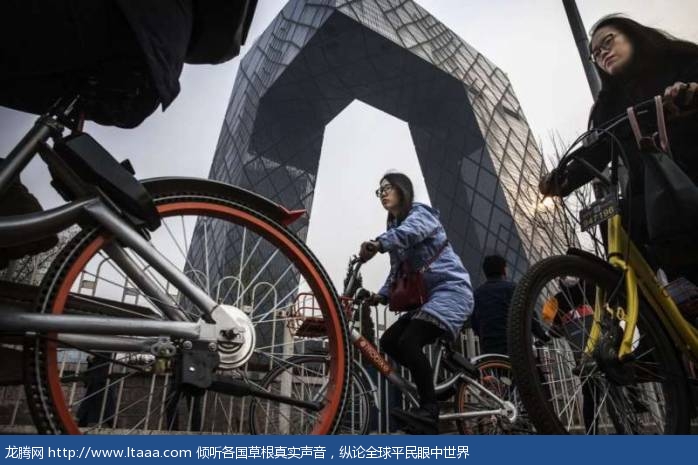忘了共享单车,在中国你能花点小钱租雨伞,篮球和洗衣机 [美国媒体]
共享单车花钱如流水,需要靠数十亿美元的资本支撑。中国的投机资本家们已经成了共享狂,资助公司来为用户共享千奇百怪的东西,包括洗衣机,篮球和雨伞。美国网友:为啥文章老把这些生意称为“科技”?街角在黄页上打广告的小店跟它们科技水平倒差不多。它们又为啥叫“共享”?我妈跟我说,共享是把你自己拥有的东西给别人。这跟租不一样.......
Forget car-sharing. In China, you can rent umbrellas, basketballs, washers — for a fee.
忘了共享单车,在中国你能花点小钱租雨伞,篮球和洗衣机
Chinese commuters ride bikes through a sharing program in Beijing. The popularity of bike shares has exploded in the past year with more than two dozen providers now battling for market share in major cities across China.
(图片)中国上班族通过一项北京的共享计划来骑自行车。在去年一年,随着二十多家供应商在全中国的争抢市场份额,共享自行车数量呈爆炸性增长。
By Emily Rauhala
作者 Emily Rauhala
BEIJING — Sometimes, when considering the orgy of spending that is China’s start-up scene, it’s fun to imagine the pitch meetings.
北京—有时候,当考虑到如此规模的资本狂欢才是中国的启动阶段的时候,想像高潮来的情景会很有趣。
“It’s like Uber, but for beds.”
“Bed sharing?”
“I know it sounds funny but — ”
“Take my cash.”
“这个很像优步,不过是床的版本。”
“共享床?”
“我知道听起来有点好笑,但是—”
“闭嘴,给你钱。”
That exact exchange did not happen. But it may not be far off. Chinese authorities recently shuttered a service that let people pay to sleep in windowless pods. There were questions about hygiene, according to local reports.
这个对话还没发生。但是可能不远了。中国当局最近叫停了一项让人们花钱睡在没有窗子的小舱室里的服务。据当地报道,是因为担心卫生的问题。
Perhaps there should be more questions. Flush with cash and buoyed by a billion-dollar boom in bike sharing, China’s venture capitalists have gone sharing mad, funding companies that allow users to share items including washing machines, basketballs and umbrellas.
或许应该当心更多的问题。共享单车花钱如流水,需要靠数十亿美元的资本支撑。中国的投机资本家们已经成了共享狂,资助公司来为用户共享千奇百怪的东西,包括洗衣机,篮球和雨伞。
In some ways, the enthusiasm makes sense. China’s vibrant but tightly regulated tech sector has been booming, with sharing leading the way. Chinese ride-hailing (and -sharing) giant Didi bought out Uber China. Airbnb is fighting Chinese rivals to win a piece of the home-share market.
某种程度来说,这种热情是有道理的。中国的科技板块有活力但又被严格控制,共享经济一骑绝尘。中国打车(还有共享)的巨人滴滴已经收购了了优步中国。爱彼迎为了在中国市场抢一块肉也在和中国的对手打得火热。
The country’s top leaders know they must shift from manufacturing and resource extraction to a service-based economy powered, in part, by the Web.
这个国家的领导人知道他们必须从制造业和资源集中的产业转移到以服务业为基础的经济动力,一部分就是通过网络。
To help things along, the state has thrown money into the start-up scene and nurtured homegrown tech companies, in part by keeping others out. (Sorry, Google.) It has also used its vast propaganda apparatus to cheerlead for local start-ups, waxing poetic about umbrella sharing, for example.
为了帮助这个愿景实现,国家已经在起步阶段大量投资,培育本地的科技公司,有时候通过把外国公司挡在门外(对不起了,谷歌)。它还使用宣传机器为本地的创业者摇旗呐喊,比如说,对共享雨伞写诗赞颂。
In April, a commentary in the People’s Daily, a Communist Party-controlled newspaper, called a Chinese umbrella sharing start-up “a sign of progress in public service and a show of human care, releasing the warmth of the city.” The company later made headlineswhen nearly all of its 300,000 umbrellas went missing.
四月的时候,人民日报(一家共产党控制的报纸)的一篇评论,把共享雨伞的创业称为“公共服务进步和展现人文关怀的一个符号,释放了城市的温暖”。这家公司后来上了头条,因为几乎所有三十万把伞都不见了。
At a 2016 tech conference, Robin Li, chief executive of the search engine Baidu, suggested that the sharing economy is in tune with China’s socialist ethos. Both, he said, focus on distribution according to need.
在2016年度一个科技会议上,百度搜索引擎的掌门人李彦宏说,共享经济和社会主义的基调非常合拍。他说,两个都专注于按需分配。
The new, government-run Sharing Economy Research Center estimates that the sector grew 103 percent in 2016, with deals close to $500 billion. The researchers predicted an annual growth rate of 40 percent in the years ahead. By 2020, the sharing economy will account for 10 percent of the country’s gross domestic product, the center said.
And yet, nobody seems sure what “sharing economy” means.
一家新的国营的共享经济研究中心估计,2016年共享经济成长了103%,交易额接近5000亿美元。研究者预估,此后几年的成长率为40%。到2020年的时候,共享经济将占GDP的10%。但到目前为止,好像没人能说清楚到底“共享经济”是什么。
Gao Shen, a partner at Phoenix Tree Capital Partners, said there are two things going on.
Companies such as Didi and Tujia, a Chinese house-sharing firm, took existing resources — cars, homes — and made them available to others for a fee. Many of the new, self-described sharing start-ups do not use “idle resources,” he said.
高深(音译),凤凰树资本合伙人的股东,说两件事正在发生。像滴滴和途家(一家房屋共享的公司)这样的公司,把已经存在的资源,比如汽车和房子,提供给用户付费使用。很多新的公司,自称为共享创业者,他们不使用“闲置资源”。
If a company orders a bunch of new bikes or umbrellas and lets people rent them with their phone, is that sharing? Or is it renting with your phone?
如果一家公司购买了很多新自行车或雨伞,然后让人们用手机租赁,这个叫共享么?还是应该叫手机租赁?
A Chinese government newswire recently covered the launch of a shared washing machine service. There’s also a shared drying service. Anywhere else, they would be called laundromats. Or, perhaps, laundromats where you pay with your phone.
最近,一个中国官方新闻报道了共享洗衣机服务。还有一个共享烘干服务。如果在其它任何国家,这个都会叫洗衣店,或者,没准叫手机支付洗衣店。
Along the same lines, is a phone-activated, two-person karaoke booth in a mall a karaoke share, or just a smaller and louder version of the status quo, plus phone?
与此类似,一个手机激活,两人的k歌亭应该被叫做共享KTV,还是应该叫更小更吵的KTV加手机呢?
What’s more, not everyone seems to understand the meaning of rent.
还有,好像有人不理解租赁的意思。
Like the umbrella company, Chinese bike-sharing start-ups have struggled to keep up with theft and vandalism, with one company, Wukong, reportedly losing 90 percent of its bikes in about six months.
就像那家雨伞公司,共享单车的创业者们一直和偷窃和故意破坏作斗争。一家叫悟空的公司,据报道在大概六个月内丢了90%的自行车。
In some cases, companies are launching products that seem like less convenient versions of things that already exist — a fact that does not seem to stop the funding.
还有一些情况,有些公司似乎在提供比现有的东西更不方便的版本,但这并没有妨碍有人投资。
Andy Xie, an independent economist in Shanghai, said the rush of investment feels a lot like a bubble. “In the past four, five years, every year there is something different to speculate on,” he said.
一位上海姓谢的独立经济学家说,这样资本的狂热感觉非常像是泡沫。他说,“过去的四五年里,每年都有些新的稀奇古怪的东西出现”。
Beijing, a city with free workout machines in public parks, now has “shared gyms,” a.k.a, outhouse-size workout pods activated by your phone. Investors are betting that people will pay for the chance to sweat and jiggle in a small glass box on the street.
在北京,公园里本来就有免费的健身器械,但现在出现了“共享健身房”,也就是户外的健身舱室,手机激活。投资者打赌人们会在大街上的透明盒子里挥汗如雨。
A recent People’s Daily write-up described the opening of “the world’s first shared bookstore.” Again, you can imagine the pitch.
一篇人民日报最近的马屁文章描写了“世界第一家共享书店”的发布。又一次,你能想象到它的语调。
“Shared bookstore? . . . That sounds a lot like a library.”
“Better, it’s a library where you pay with — ”
“Sold.”
Yang Liu and Shirley Feng reported from Beijing.
“共享书店?。。。听起来很像图书馆。”
“比图书馆更好,你能用—”
“好好好。”
Yang Liu and Shirley Feng
北京报道。
Jerry19475
Ya--They love share our technollogy ...
对,他们就爱共享我们的科技。
JONWINDY
How about wives? There's a new slant!
我有一个大胆的想法。老婆?
Spike Gazinsky
Why do articles always refer to these businesses as "tech." There's as much tech in them as a corner store that advertises in the Yellow Pages. And why are they "sharing?" My mom taught me that sharing is letting someone else have some of what you have. That's different than renting. With the definitions being used, U-Haul is a sharing economy tech business. And United Airlines. But we don't call them "sharing" or "tech."
为啥文章老把这些生意称为“科技”?街角在黄页上打广告的小店跟它们科技水平倒差不多。它们又为啥叫“共享”?我妈跟我说,共享是把你自己拥有的东西给别人。这跟租不一样。要照这么说,U-Haul(一家出租卡车公司)是共享经济科技公司,美航也是。但我们可不叫它们“共享”或“科技公司”。
版权声明
我们致力于传递世界各地老百姓最真实、最直接、最详尽的对中国的看法
【版权与免责声明】如发现内容存在版权问题,烦请提供相关信息发邮件,
我们将及时沟通与处理。本站内容除非来源注明五毛网,否则均为网友转载,涉及言论、版权与本站无关。
本文仅代表作者观点,不代表本站立场。
本文来自网络,如有侵权及时联系本网站。
图文文章RECOMMEND
热门文章HOT NEWS
-
1
Why do most people who have a positive view of China have been to ...
- 2
- 3
- 4
- 5
- 6
- 7
- 8
- 9
- 10
推荐文章HOT NEWS
-
1
Why do most people who have a positive view of China have been to ...
- 2
- 3
- 4
- 5
- 6
- 7
- 8
- 9
- 10











